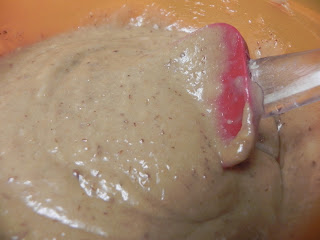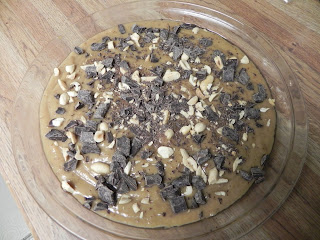 Gluten-free friends, rejoice! A gluten-free recipe that actually browns beautifully. Okay, so it's not really that exciting for most people, but if you're used to eating GF, then you're also used to things that are slow to brown, or which don't brown at all -- which for bread recipes, can be rather frustrating.
Gluten-free friends, rejoice! A gluten-free recipe that actually browns beautifully. Okay, so it's not really that exciting for most people, but if you're used to eating GF, then you're also used to things that are slow to brown, or which don't brown at all -- which for bread recipes, can be rather frustrating.
I've had a version of this recipe on my fridge for a while, courtesy of a food co-op, but hadn't gotten around to trying it. I didn't have what I needed. Or I didn't have the time. Or I didn't have the creative energies for making it. Or...well, there were lots of excuses. And that's the thing. There are always excuses about why we should make something simple, or even why we should just go grab food to go, or have it delivered.
I finally did make it when I had a lazy weekend, and E and I were going to go swimming in the evening after she got off work. I wanted something that would be pretty much ready for us when we got home -- and this can certainly be easily prepared up to a point and then left in the oven for an hour or so and quickly rewarmed, which is exactly what we did. That's nice, really nice, because let's face it, most of us are pretty busy. That being said, this recipe does take a fair amount of prep time before it actually goes in the oven, but it's pretty low-key prep. Chopping, sauteeing, stirring the topping mix.
 |
| Chopped Turnip and Celery Root |
It was a lovely dish to come home to on a day off that had been filled with wandering around town in the pale sunshine of late December. If you're vegan, I imagine this would be pretty easy to convert to a vegan recipe using a vegan margarine or shortening in place of the butter and coconut milk (or another non-dairy milk of your choice) in place of the whole milk in the dumplings. In this case, I'd probably add some lemon juice to create a vegan buttermilk and 1/2 teaspoon baking soda .
Because this used red wine, and because we were feeling cozy, E and I mulled wine to go with this dish. Just a suggestion, but it was pretty fantastic.
Winter Veggie Cobbler
Topping
1 cup brown rice flour
1/2 cup white rice flour
1/2 cup tapioca flour
1 teaspoon guar gum
1 teaspoon
sea salt
1 tablespoon
and 1 teaspoon baking powder
3
tablespoons unsalted butter cut into small cubes
1 ½ cups
whole milk or half butter milk and milk
2
tablespoons mixed fresh herbs like thyme, marjoram or parsley, finely chopped (I used about a teaspoon dried instead and it worked fine. Who has this many fresh herbs in winter?)
Veggies
1 tablespoon olive oil
1/2 large yellow onion , chopped
4 large
carrots cut into ½ inch rounds then quarters
1 medium
size celery root peeled and cut into 1 inch pieces
1 medium
turnip peeled and cut into ½ inch rounds
1/2 medium
size sweet potato cut into 1 inch dice
3 cloves
garlic, minced
1/2 cup dry red wine
3
tablespoons tomato paste
2 ½ cups
veggie stock or water
2
tablespoons fresh herbs like thyme, marjoram or parsley chopped fine (again, I used dried herbs)
1 teaspoon
sea salt
Black Pepper
Make topping
first and let rest in the fridge while you make the veggie filling.
Topping:
Sift the dry ingredients together in a bowl. Cut in the
cold butter until the mixture resembles a coarse meal. Add herbs
and the milk. Mix very lightly with a spoon until the batter just holds
together (it comes out pretty liquidy, so make sure all the lumps are gone). Let rest in
the fridge until you make the veggie filling.
Return
skillet to high heat and add the tomato paste, toasting until fragrant. Add the
wine and veggie stock. Bring to a boil, scraping up all the browned bits in the
skillet. Simmer at a lowered heat for a few minutes.
Pour the
liquid into the baking pan. Sprinkle with the herbs, sea salt and pepper.
Use a spoon
to dot the surface of the vegetables with golf-ball sized dollops of the
topping.
Cover baking
pan with foil and bake 25 minutes at 400 degrees. Remove foil,
return dish to the oven and bake uncovered until the topping is browned, about
25 minutes. Serve warm.
 |
| Just after removing the foil to bake longer |


































